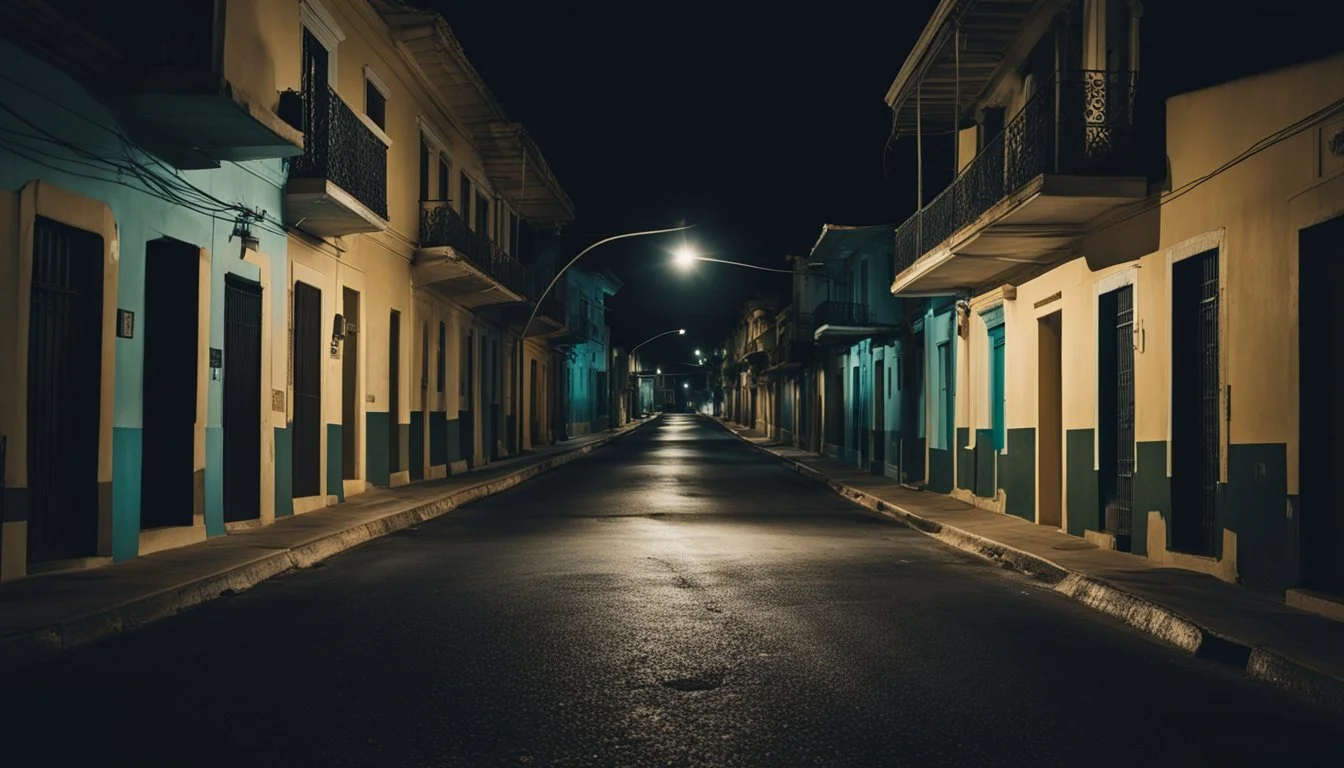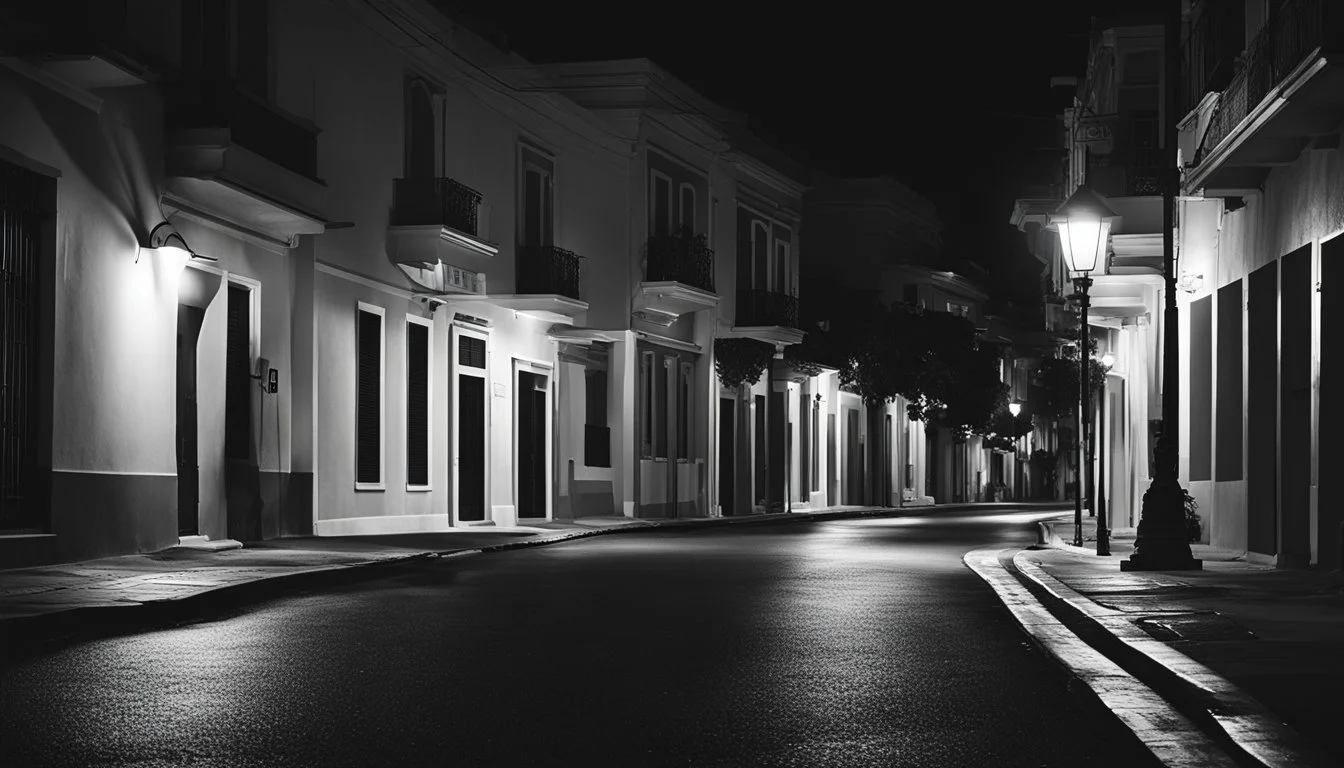7 True Crime Documentaries from Puerto Rico You Can't Miss
Puerto Rico's rich cultural landscape has often intersected with stories of crime and intrigue, providing fascinating material for filmmakers. These true crime documentaries shed light on the island's most notorious cases, capturing the complexities and the broader context surrounding each story.
These films not only recount chilling tales of crime but also offer insights into Puerto Rican society and its struggles with justice. Exploring a variety of criminal cases, these documentaries compel viewers to reflect on the broader implications of each incident.
1) Calle 13: El Veredicto (2008)
Calle 13: El Veredicto explores the controversial criminal case involving members of the Puerto Rican alternative hip-hop band Calle 13. Residente, Visitante, and their half-sister iLe engage with deep social and political issues through their music and narrative.
The documentary investigates allegations against the group, exploring cultural contexts and the impact on their career.
Released in 2008, this film delves into the intersection of music, identity, and the criminal justice system in Puerto Rico. It offers a gripping portrayal of how art and activism often walk hand in hand in the face of adversity.
For more information, visit IMDb.
2) Sin Filtro: La Historia De Alexis y Fido (2022)
"Sin Filtro: La Historia De Alexis y Fido" is a captivating true crime documentary that tells the story of the famous reggaeton duo, Alexis y Fido. It delves into the dark side of the music industry in Puerto Rico as the filmmakers explore a series of troubling events connected to the artists.
The documentary offers a detailed look at their rise to fame and the controversies they've faced. It examines how their careers have been marred by scandal, arrests, and accusations, painting a complex picture of their lives both on and off stage.
Through firsthand interviews and exclusive footage, viewers gain insight into the personal and professional challenges faced by Alexis y Fido. The film sheds light on the intersection of fame and crime, revealing how the pressures of stardom can lead to dangerous consequences.
For more information about "Sin Filtro: La Historia De Alexis y Fido," visit IMDB or Wikipedia.
This documentary is an eye-opening look into the hidden struggles within the music scene in Puerto Rico. It stands as a poignant reminder of the complexities that lie behind the glamor of the entertainment industry.
3) Escándalo: Muertes en La Isla
"Escándalo: Muertes en La Isla" shines a light on a series of scandals and mysterious deaths that occurred in Puerto Rico. The documentary exposes the complexities of the cases, examining the societal and political factors that may have influenced the outcomes.
The film dives into real-life stories that perplex and disturb. Viewers are given insight into investigative processes and judicial proceedings. It highlights the struggles faced by victims' families in seeking justice.
This documentary raises important questions about accountability and transparency within Puerto Rican institutions. It serves as a poignant reminder of the impact that unresolved cases have on the community.
For more details, visit IMDb.
4) El Caso Castrillo: Un Horror Real
El Caso Castrillo: Un Horror Real (2020) takes an unsettling look at one of Puerto Rico's most chilling murder cases. The documentary delves into the events leading up to the brutal killing of Edwin Castrillo, a prominent businessman.
Viewers are introduced to the intricate details of the investigation and the shocking revelations that emerged. Interviews with key figures, including law enforcement officials and family members, provide a comprehensive understanding of the case.
The film meticulously reconstructs the events, offering a gripping narrative that keeps audiences on the edge of their seats. Critical evidence, witness testimonies, and forensic analyses are presented to uncover the truth behind this brutal crime.
For more information on El Caso Castrillo: Un Horror Real, visit IMDB.
5) Crimen Olvidado: La Desaparición de Angie
"Crimen Olvidado: La Desaparición de Angie" (2022) explores the mysterious disappearance of Angie, a woman whose vanishing left a community in turmoil.
The documentary meticulously details the various aspects of the investigation, from the initial search efforts to the public’s reaction. Interviews with Angie's family and friends add a personal dimension to this haunting story.
The film incorporates real footage and interviews with law enforcement officials. Their insights provide a comprehensive look at the methods used to try and solve the case, highlighting both breakthroughs and frustrations.
The narrative also delves into the socio-economic factors that may have played a role in Angie's disappearance. This adds layers of complexity and context, illustrating how such tragedies can happen in seemingly tight-knit communities.
For more information on "Crimen Olvidado: La Desaparición de Angie," visit IMDb's detailed entry.
6) La Masacre de Ponce (1937)
La Masacre de Ponce is a powerful documentary that examines the tragic events of March 21, 1937, in Ponce, Puerto Rico. This documentary sheds light on the massacre that occurred when a peaceful civilian march turned violent after police opened fire.
The march aimed to commemorate the abolition of slavery and was organized by the Puerto Rican Nationalist Party. However, it ended with 17 civilians and two policemen dead, and more than 200 people wounded. Most of the dead were shot in the back, emphasizing the brutality of the attack.
The film delves into the political and social context of the time, highlighting the role of U.S.-appointed governor Blanton Winship in ordering the police action. Through interviews, archival footage, and expert analysis, the documentary paints a vivid picture of the tensions in Puerto Rico during the 1930s.
La Masacre de Ponce presents an unflinching look at one of the darkest moments in Puerto Rican history, ensuring that the memory of those who suffered and died is not forgotten.
For more information on La Masacre de Ponce, visit Wikipedia.
7) Rescatando la Verdad: La Vida de Marta Torres (2023)
"Rescatando la Verdad: La Vida de Marta Torres" offers a gripping exploration of one of Puerto Rico's most unsettling cases.
The documentary chronicles the harrowing story of Marta Torres, whose mysterious disappearance in 1995 captured national attention. Combining archival footage, interviews with law enforcement, and testimonies from those close to Torres, the film paints a vivid picture of the case's complexity.
Key figures in the investigation, including Detective Luis Rivera, provide insight into the obstacles faced during the search for Torres. The documentary meticulously examines the twists and turns that hindered progress and the community's response to the unfolding events.
The inclusion of personal diaries and letters adds an intimate layer, revealing Torres' state of mind leading up to her disappearance. This personal perspective is crucial in understanding the broader social and cultural factors at play.
"Rescatando la Verdad" not only seeks justice but also delves into the impact the case had on Puerto Rican society. The film serves as a critical piece in the puzzle of one of the island's enduring mysteries.
For more information: IMDB
Cultural Impact of True Crime Stories
True crime documentaries shape cultural perceptions and societal behaviors in significant ways. Puerto Rico's unique perspective and the broader societal influences from these narratives are key factors to explore.
Understanding Puerto Rico's Unique Perspective
Puerto Rico's complex history and legal system create a distinct lens through which its residents view true crime stories.
High-profile cases often highlight the island's struggles with crime, governance, and social justice.
These documentaries provide a window into the local culture, reflecting both the resilience and challenges of the community.
True crime content from Puerto Rico often emphasizes issues such as corruption, gang violence, and the impact of socio-economic disparities.
This unique perspective offers viewers a deeper understanding of Puerto Rican society and its ongoing battles for justice and reform.
How True Crime Documentaries Influence Society
True crime documentaries have a profound effect on both individual perceptions and broader societal attitudes.
They often raise awareness about criminal justice issues, prompting discussions and debates on legal reform and ethical practices.
These narratives can also impact the behavior of their audience, fostering either heightened fear of crime or increased vigilance in communities.
Additionally, true crime media influences the judicial system, potentially swaying public opinion and even affecting jury biases.
By turning real-life events into compelling stories, these documentaries hold significant power in shaping public understanding and responses to crime and justice.
Notable Cases Explored in Documentaries
This section focuses on notable true crime cases in Puerto Rico that have been explored in documentaries, highlighting their historical context and key figures involved in the investigations.
Historical Context and Background
La Operación delves into the controversial history of mass sterilization in Puerto Rico during the mid-20th century. This period saw rapid industrialization and population growth, leading to aggressive birth control measures.
Another crucial case is Felix Verdejo Sanchez. The young boxer’s case brought a spotlight on the darker side of sports fame. His talent was once celebrated widely, especially during the 2012 Summer Olympics in London.
These cases provide a deeper look at Puerto Rico's social, economic, and political challenges over the decades. The narratives are set against the complex backdrop of colonial legacies and modernization efforts impacting Puerto Rican society.
Key Figures and Investigations
Felix Verdejo Sanchez was a promising Puerto Rican boxer whose involvement in a high-profile case shocked the nation. Investigations revealed the tension between his public persona as a sports hero and his private struggles, leading to tragic consequences.
La Operación features numerous women subjected to sterilization without proper consent. This documentary sheds light on the medical professionals and policy-makers driving these drastic measures. Interviews with affected individuals and archival footage play a crucial role in understanding the scope and impact of these actions.
By examining these key figures and investigations, these documentaries bring critical awareness of the systemic issues faced by Puerto Ricans, contributing valuable perspectives to ongoing conversations about justice and human rights.
Filmmaking Techniques in True Crime Documentaries
True crime documentaries use various filmmaking techniques to create compelling narratives and bring real-life cases to audiences. Key techniques include distinct interview strategies, reenactments, and the careful use of archival footage.
Interview Strategies and Reenactments
Interview strategies in true crime documentaries are crucial. Filmmakers often use interviews with key witnesses, victims' families, law enforcement officers, and sometimes the accused themselves. These interviews provide personal perspectives and emotional depth.
Reenactments help visualize incidents when actual footage is unavailable. They enhance storytelling by allowing viewers to see a dramatized version of events. Effective reenactments rely on meticulous attention to detail. They should be accurate and respectful, avoiding sensationalism.
Use of Archival Footage and Visual Storytelling
Archival footage serves as a powerful tool in true crime documentaries. It includes photos, videos, news clips, and other historical documents. This footage lends authenticity and context to the narrative.
Visual storytelling techniques, such as the use of location shots and crime scene photos, immerse viewers in the investigative process. The combination of archival footage and visual aids helps convey the gravity of the events and supports the film’s factual basis.











